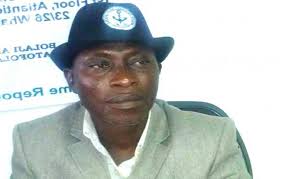The recent upsurge in the number of piracy attacks on vessels in the Gulf of Guinea as well as the frequency of the attacks has become a source of worry to many industry watchers.
One of them, a former President of the Nigerian Merchant Navy Officers and Water Transport Senior Staff Association, Engr. Matthew Alalade who spoke in an interview with our correspondent in Lagos on Tuesday said that the development should be a source of worry to every maritime operator in Nigeria.
Alalade recalled that the Director General of the Nigerian Maritime Administration and Safety Agency (NIMASA) came out few months ago to say that they had some information that some Somali pirates were infesting the Gulf of Guinea and that they were still watching the trend for the next line of action.
While pointing out that although the veracity or otherwise of that statement could not be independently ascertained by the operators, he however asserted that since the comments by the NIMASA DG, “we are hearing events of attacks, kidnappings almost on a weekly basis even sometimes twice a week according to IMB reports.”
He noted that “since the disclosure of the presence of the Somali pirates on our waters, we have not heard anything and we are disturbed that the seafarers in Nigeria are no longer safe, although, all over the world, it is the seafarers that being affected. So, we are being disturbed and are begging the agency concerned, they should see that there is a lot of platforms so that the Navy can effectively police our waters.”
“We are not pleased at all because it is coming on weekly basis and Nigeria maybe termed a war risk zone. So, it is something that the federal government must re-strategise on what to do, invite the stakeholders in the industry for a meeting on way forward as it affects piracy.
“Now, the Honourable Minister of Transportation went to engage an Israeli company last two years or so in a contract to supply platforms but we are yet to see the contract take off. The federal government is talking about the Israeli contract but we don’t believe the contract will change anything because these things are localized crimes which I believe can be solved locally. So, this Israeli of a thing, I don’t know whether it is another way for government officials to siphon money.
”Now, we are seeing this on weekly basis and we don’t know what the government is doing about it because it is gradually degenerating and that is disturbing trade in Nigeria because nobody will like to bring his vessel here to come and trade here especially this Niger-Delta region, they are being affected mainly apart from Cotonou and Lome. They may prefer to go to other regions.”
On what could be the major cause of this menace, he said, “Chiefly among them is unemployment and the government must liaise with the local people because they know their boys, they must have meeting with them to ascertain what their demands are. Government too should do something to engage the youths so that they won’t have time to engage in all these nefarious activities. Since the government failed in this wise, the youths take the laws into their hands in order to survive, that is what we felt is causing this incessant piracy attack on our waters. So, they recourse to hijacking of vessels believing that if they do so, they will be settled by ransom and nobody is talking about the ransom, you just hear that they released a vessel but the ransom payment is never mentioned. So, the government must be on its toes to address the rate of unemployment generally.”
While describing the enactment and subsequent signing into effect the Anti-piracy law as a right step in the right direction, the former President believed that “if there is a law, it will also checkmate the rate of piracy even as he suggested that they must speed up the law process also so that it will not be so long to adjudicate a matter because marine is not something that will drag for a long time.”
“If we have law in place, people will be scared to go and commit piracy. If they prosecute offenders successfully, it will instill fear in intending offenders”, he added.
“Notwithstanding, the government must see it critically that there is marine job; there should be vessels because most of our cargoes are being carried by foreign vessels. So, what is happening to the Nigerian ship owners? But if the Nigerian ship owners have quota, then it will indirectly affect the indigenous seafarers positively by gaining them employment. We have been hearing of plans to re-establish the national shipping line, but let us see it materialize”, he further stated.
Photo: Former President of the Nigerian Merchant Navy Officers and Water Transport Senior Staff Association, Engr. Matthew Alalade.
Send your news, press releases/articles to augustinenwadinamuo@yahoo.com. Also, follow us on Twitter @ptreporters and on Facebook on facebook.com/primetimereporters or call the editor on 07030661526, 08053908817.

